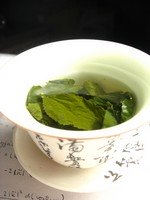Solving problems every tea drinker faces.
Exclusive subscriber benefits:
Receive four FREE quality ebooks worth $60
-
Save at least $5 during your first purchase
Stomach upset is the second most common complaint I hear from tea drinkers after caffeine intolerance.
The culprits? Caffeine and polyphenols. They cause indigestion by stimulating the production of gastric acid.
Indigestion is often described as a feeling of fullness, bloating, nausea or gassy discomfort in the chest or abdomen. The symptoms develop during meals or shortly afterwards.
Tea can also be a problem for those prone to heartburn and stomach ulcer. Heartburn results when gastric acids rise up and spill into the oesophagus causing irritation.
Here are some tips on how to deal with green tea and stomach gastric irritation.
 Tea
is not the only food that causes the stomach to produce acids. Beverages such as
coffee, caffeine or carbonated beverages and alcohol have the same
effect.
Tea
is not the only food that causes the stomach to produce acids. Beverages such as
coffee, caffeine or carbonated beverages and alcohol have the same
effect.
Watch out for foods such as raw onions, garlic, black pepper, chili, vinegar, spicy foods, cloves, nutmeg and all fatty foods such as dairy. They, too, irritate the stomach.
Avoid cooking food with fat or oil. Boil. Broil. Bake. Grill. Poach. Steam. Avoid frying.
Avoid a large meal that completely fills the stomach. Eat slowly. Chew thoroughly.
If you drink loose tea, brew it half-strength. Add not more than 2 to 3 grams of leaves per cup. Full-strength tea causes the stomach to secret more acid.
 Drink tea in between meals. Avoid drinking tea with a meal or half an hour
afterwards.
Drink tea in between meals. Avoid drinking tea with a meal or half an hour
afterwards.
Avoid drinking tea with an empty stomach.
Drink tea with some ginger. Some people have found it soothes the stomach.
Add milk and sugar. A 1984 study found that milk and sugar reduce gastric acid production.
If you add milk, try using soya milk. A recent study about tea with milk found that animal milk contains casein that binds to catechins (the stuff that contains most of the tea antioxidants), reducing their effectiveness.
Soya milk contains lecithin that has a different molecular structure to casein, and so is unlikely to bind to tea catechins the way casein does.
Try drinking a darker oolong tea (such as the Wuyi Rock tea) or an aged oolong or pu-erh tea. They tend to be gentler on the stomach. Alternatively, go herbal.
To a Chinese mind, the alkaline nature of tea conflicts with the acids produced by the stomach. When consumed wrongly by some individuals, it causes indigestion. It is about BALANCE.
To a Western mind, tea beverages stimulate the production of gastric acid, leading to indigestion for some individuals. It is about CAUSE and EFFECT.
They may be talking about the same thing: the alkaline nature of tea dilutes the acids in our stomach, causing it to secret more acid, but with different mindsets.
New! Comments: Like This Story? Leave A Comment!
References
Dubey P, Sundram KR, Nundy S (1984). Effect of tea on gastric acid secretion. Digestive diseases and sciences. 1984 Mar; 29(3):202-6.
Related Articles
Regular green tea drinkers are half as likely to develop stomach and oesophageal cancer compared to non drinkers.
Back to Top of Green Tea and Stomach
Back to Green Tea Side Effects Main Page
Back to Amazing Green Tea Home
Solving problems every tea drinker faces.
Exclusive subscriber benefits:
Receive four FREE quality ebooks worth $60
Save at least $5 during your first purchase
Copyright� 2006-2025 Amazing-Green-Tea.com. All rights reserved.

